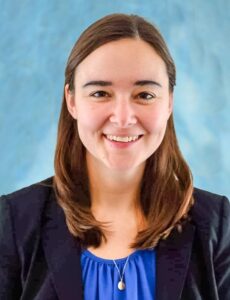Julia Selfridge, MD, joined the UNC Department of Surgery as an Assistant Professor in the Division of Surgical Oncology. She joined us to discuss her path to specializing in breast surgical oncology and her goals as a physician and professor.
Dr. Julia Selfridge received her undergraduate degree in Microbiology, Immunology, and Molecular Genetics along with a minor in Spanish from the University of California, Los Angeles. She went on to medical school at Virginia Tech Carilion School of Medicine. She completed her residency in General Surgery at VCU Health, followed by a fellowship in Breast Surgical Oncology at H. Lee Moffitt Cancer Center.
What brought you to the Department of Surgery at UNC?
I always wanted to practice as an academic surgeon in an environment that would allow me to provide excellent clinical care, contribute to research, and educate trainees at all levels from medical school to fellowship. Throughout my surgical training, I had mentors who were trained or had worked at UNC, and I held its surgery program in high esteem. When a position became available within the department, I knew I wanted to join the team at UNC and jumped at the opportunity.
What inspired you to become a surgeon?
I was always interested in math and science as a child. I grew up in the Santa Cruz Mountains of California and loved natural science and learning about why biologic processes work the way that they do. After witnessing the way illness affected several family members, I realized I could pursue medicine and combine my interest in science with clinical service.
How did you decide to pursue your current specialty? Has it met your expectations?
I’ve been interested in oncology since college. As an undergraduate, I studied molecular genetics and was able to apply that knowledge to cancer biology and microbiology research. When I started medical school, I anticipated specializing in oncology or infectious disease. However, I found during first surgery rotation that I loved it! I was also happy I could incorporate my scientific interests into the subspecialty of breast surgery. I also appreciate that in breast surgical oncology I work with my patients to support them through different aspects of their care as part of an integrated, multidisciplinary team.
What are some goals you would like to achieve during your time at UNC Surgery?
In addition to providing excellent clinical care for patients at UNC, I would like to contribute to top-notch surgical education to our students, residents, and fellows. I plan to initiate research within the areas of my academic interests, which includes quality improvement, resident education, pregnancy-associated breast cancer, occult primary breast cancer, and inflammatory breast cancer.
What are the failures you most cherish? What did you learn from them?
Medical education and training is consistently humbling. I would say that there is no particular incident that stands out to me. Rather, what I cherish is that at each point in my training, including medical school, residency, and breast surgical oncology fellowship, I had to re-evaluate the educational tools I was using and ensure that they were the best options to help me learn and grow. This was not always a straightforward process, but it is very rewarding to grow as a physician and pass on to others the resources that helped me be successful.
What do you do when you aren’t working?
In addition to spending time with family and friends, I enjoy playing the cello and violin.
I also like reading fiction because it allows the reader to better understand the way others think and experience life, especially in other parts of the world. I’m slowly making my way through the Pulitzer Prize fiction winners as a way of broadening the novels I read.
How would you describe yourself in one word?
Conscientious
If you could have one superpower, what would it be and why?
Elemental control, which would include the ability to control fire, Earth, air, and water. You would have the power to help others in emergency situations, and it would also allow you to have additional fantastic experiences like fly on the wind or explore the bottom of the ocean.
What is one thing you wish your patients or coworkers knew about you before they meet you?
I want patients to know that I will listen to them, respect them, and will honor the choices they make. I see each patient as an individual in the context of their life and I am interested in finding the best options that fit with what they need and want for their care.
For more information about Dr. Selfridge, check out her faculty profile or UNC Health Care profile.

